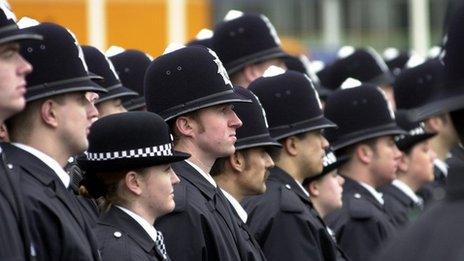Crime in England and Wales down 10%, survey shows
- Published
- comments

Police figures and a crime survey both show a fall in crime
Overall crime fell by 10% in England and Wales in the year to September 2013, official figures show.
The Crime Survey of England and Wales (CSEW) said there were eight million crimes against households and adults in that period.
It is the lowest estimate since the survey began in 1981.
The figures, published by the Office for National Statistics (ONS), external, estimate crime levels based on how many people say they have been victim of a crime.
The CSEW said household crime, related to vehicles and property, was down by 10%, while personal crime, including thefts from the person and violent crimes, fell by 9%. It also estimated violence had fallen by 13%, taking it to its lowest level for 33 years.
Police figures also showed a fall in offences. The ONS published data from forces showing there had been 3.7 million offences in the same period, a decrease of 3% compared with the previous year.
However, the National Statistics designation has been removed from all crime data recorded by the police after the UK Statistics Authority said it could not be approved owing to claims of unreliability.
Serving Metropolitan Police officer Pc James Patrick told MPs last month that crime figures were manipulated to hit performance targets, adding that this had become "an ingrained part of policing culture".
Prime Minister David Cameron tweeted, external "congratulations" to police, saying the fall in crime was "bringing security to people".
The number of sexual offences recorded by police increased by 17%, which the ONS said "is likely to be partly due to a continuation of a 'Yewtree effect', whereby a greater number of victims have come forward to report historical sexual offences to the police".
There was a 122% rise in the number of historical sex crimes - those which happened more than 20 years ago - recorded by police in the year to September 2013.
This followed the Savile revelations which came to light the previous October. There was a 35% rise in sex crimes that had happened between one and 20 years ago and an 11% increase in crimes that took place in the past 12 months, according to police figures.
There were "signs of increasing upward pressures" in some other offences, including a 4% rise in shoplifting and a 7% increase in theft from the person, the ONS said.
One ex-officer tells the BBC: "Those figures are manipulated and wrong... it's a deception"
The national lead on crime statistics of the Association of Chief Police Officers, Chief Constable Jeff Farrar, described the fall in crime in the CSEW as "encouraging".
Minister for Policing, Criminal Justice and Victims, Damian Green: Crime statistics must be "gold standard"
He said: "Accurate crime statistics are not only essential in holding police accountable for the work they do in the ongoing fight against crime, but also vital in ensuring that police officers and staff are deployed to the right place at the right time.
"It is disappointing that the UK Statistics Authority has decided to remove the National Statistics designation from police-recorded crime statistics as this has come at a time when the service is working to make crime statistics more transparent, more accountable and assure the public of the figures' integrity."
Four police forces showed an increase in overall crime. Northumbria, City of London and British Transport Police reported a 1% rise, while Kent showed an 8% increase, but this is believed to be due to a change in recording practices.
There was no change in Cumbria, Gwent, Humberside and Merseyside.
Crime prevention minister Norman Baker said: "England and Wales are safer than they have been for decades with crime now at its lowest level since the survey began in 1981.
"The government has made clear that recorded crime statistics must be as robust as possible and we have a strong record on reinforcing their independence and accountability."
- Published21 January 2014
- Published16 January 2014
- Published30 December 2013